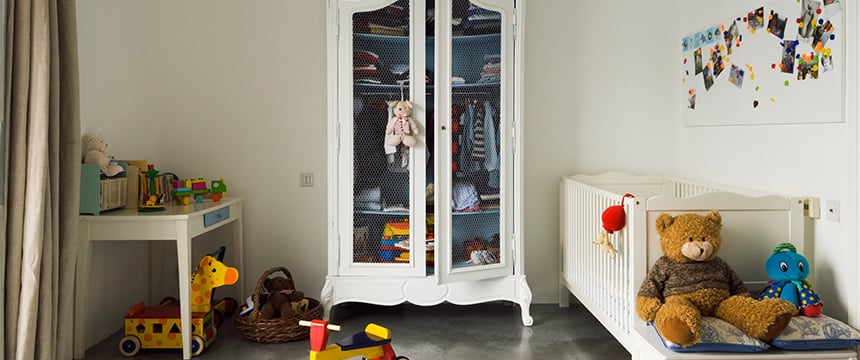
The Consumer Product Safety Commission (CPSC) has long focused on consumer products that pose unique risks to children, especially products in the home like clothing storage1 and window coverings;2 this emphasis has only increased in recent months. As Chair Alexander Hoehn-Saric made clear in a rejection of a proposed voluntary standard on infant sleep products, the CPSC’s efforts reaffirm the Commission’s “commitment to protecting the most vulnerable among us.”3 Manufacturers, importers, distributors, and retailers should take note of these increased efforts and anticipate that the Commission will continue to focus on products likely to pose risks to children—whether those products are specifically manufactured and marketed for children or not. As part of this focus, the industry will need to pay attention to a shifting landscape of safety standard regulation and enforcement for products in the home.
A Shifting Landscape for Clothing Storage Units
Clothing storage units (“CSUs”) pose unique risks to children, most especially through harmful or fatal tip-overs. Of the 234 known fatalities from such tip-overs from January 2000 to April 2022, 199 of them were child fatalities. Further, from January 2000 to July 2022, there have been 43 recalls in response to tipping hazards of such furniture.4 Last fall, the CPSC approved a mandatory federal safety standard for CSUs that purported to “significantly change the way clothing storage units are tested and labeled.”5 At a basic level, the standard required CSUs to exceed minimum stability requirements and to display certain information.6 The standard was published in the Federal Register on November 25, 2022 with an effective compliance date of May 24, 2023.7 However, on December 23, 2022, as part of the fiscal 2023 omnibus spending bill, President Biden signed a law that potentially conflicts with these efforts. The Stop Tip-overs of Unstable, Risky Dressers on Youth (“STURDY”) Act essentially directs the CPSC to finalize a mandatory CSU stability standard to prevent tip-over injuries and fatalities.8 The development of a comprehensive, final safety standard for CSUs remains in flux due to the passage of the STURDY Act, as it is unclear what rules will apply in the near future. However, prior to the final adoption of a standard, the CSU industry will need to navigate an uncertain and changing enforcement landscape.
Along with the CPSC’s approval of its own furniture standard, Chair Hoehn-Saric noted that “change has come far too slowly” in this area, calling the adoption of the standard a “huge step” for children’s safety.9 Several other Commissioners gave similar statements, pointing out the purported industry lag in correcting the risks that CSUs pose to children due their ordinariness and ubiquity.10 While Commissioner Peter Feldman said that he is encouraged by the CPSC’s efforts to address tip-overs, he voted no on the final rule and said the agency should have first put it out for a Supplemental Notice of Proposed Rulemaking (SNPR) to strengthen the final version.11 Commissioner Feldman proposed an amendment that would have explicitly required a SNPR, both to strengthen it against potential challenges, but also to address the potential conflict and potentially superseding nature of the STURDY Act.12 Commissioner Feldman stated that he preferred the additional time to complete the SNPR to see if the STURDY Act would become law to “avoid any confusion between a statute and a CPSC regulation.”13
The STURDY Act effectively supersedes the CPSC standard adopted late last fall, depending on how the CPSC addresses its requirements.14 The Act compels the CPSC to adopt a mandatory standard applicable to CSUs, using a test weight of 60 pounds, in testing that simulates “real-world use.”15 The real-world conditions provided by the Act relate to carpeted surfaces, drawers containing items, multiple open drawers, and dynamic force such as that applied by climbing children.16
The passed version of the Act is a modification of a version that passed the House of Representatives in 2021. Originally, the House version of the Act would have allowed a “fast-track rulemaking process” for the CPSC.17 However, after some industry stakeholders negotiated an amendment, the law directs the CPSC to adopt ASTM F2057-19.18 This is a voluntary standard, but the STURDY Act directs the CPSC to adopt it as a mandatory standard, as long as it is updated to meet other STURDY Act requirements.19 The Act also requires CSUs to pass “objective, repeatable, and measurable tests” in “real-world” conditions.20
The STURDY Act requires the CPSC to adopt the ASTM standard as a mandatory standard within a year of the law’s enactment, so long as the standard meets the performance requirements set out in the Act.21 However, the STURDY Act still allows the CPSC to override the Act’s mandatory requirements by “strengthen[ing] the warning requirements of ASTM F2057-19” if necessary.22 If the CPSC determines the ASTM F2057-19 voluntary standard fails to meet the performance requirements in the STURDY Act, it could still “force through its complex testing and stability rating scheme.”23
Proponents of the STURDY Act have opposed the CPSC’s unilateral efforts on the subject of tip-over prevention. Indeed, the American Home Furnishings Alliance (“AHFA”) sought judicial review of the new standard in the United States Court of Appeals for the Fifth Circuit.24 Commissioner Feldman warned of concerns about “legal vulnerabilities” in his statement on the CPSC’s standard, although he also said “there are now two potential solutions to protect consumers from tip-over dangers.”25 What happens next depends on whether the CPSC finds the updated ASTM standard satisfactory—and, if not, how it “strengthen[s] the warning requirements of ASTM F2057-19.”26
Currently, ASTM F2057-19 prescribes three tests for CSUs: (1) all drawers loaded with 8.5 pounds per cubic food; (2) simulating stability impact when the CSU sits on carpet; and (3) simulating dynamic force of a child grabbing the highest hand-hold on the unit.27
ASTM has 60 days to publish revisions of the standard to satisfy STURDY’s requirements.28 Following that, the CPSC will have 90 days to review the updated standard to determine whether it will adopt it under the STURDY Act.29 Following the adoption of a standard under the Act—which the Act requires—the new rule will take effect 120 days after its adoption by the Commission. Whatever final shape the rule takes, it will supersede the CSU standard adopted last October.
Although some industry advocacy groups like the AHFA have celebrated the passage of STURDY, ultimately, the final CSU standard remains in flux.30 Some advocacy groups propose that STURDY’s supersession of the CPSC standard will result in more fairness and enforceability due to the reduced complexity of the applicable standard.31 Regardless, changes are coming for CSU manufacturers, importers, distributors, and retailers—and it may not be until later in 2023 that the industry will have a final standard with which to comply. For now, the CPSC’s adopted standard is not effective until May 24, 2023, and it will be several months before a final rule takes effect following the passage of the STURDY Act. In the meantime, the industry should prepare for a standard protecting against real-world dangers of unstable CSUs—but bear in mind that the CPSC could decide to continue to push for a more complex system. One solution for industry may be to aim to comply with or exceed the most rigorous criteria across all standards so their products comply with whatever form the final rule ultimately takes.
New Rules for Other Home Product Categories
The CPSC’s emphasis on protecting children in and around the home extends further than furniture. This past fall, the Commission also addressed the long-existing hazards of corded window coverings to infants and children. About nine children under the age of five die every year from strangulation by corded window coverings, and still more suffer injuries.32 And, on November 2, 2022, the CPSC adopted two mandatory safety rules on corded window coverings.33
The first rule is a mandatory consumer product safety rule under the Consumer Product Safety Act (CPSA) and establishes performance requirements for safe operating cords on custom window coverings.34 This standard was to take effect on May 30, 2023, 180 days after publication in the Federal Register, but an order issued by the United States Court of Appeals for the D.C. Circuit on January 10, 2023 stays the rule pending court review.35 The second rule, applicable to both stock and custom window coverings, deems the presence of certain inner and outer operating cords to be a substantial product hazard under the CPSA.36 It takes effect 30 days after publication in the Federal Register for products manufactured after that date.37
In accompanying statements, the Commissioners reinforced the Commission’s objective to protect children. In particular, they pointed out the bipartisan nature of the standards and the “years of work” necessary to adopt them.38 Chair Hoehn-Saric noted that these changes were “long overdue.”39 Again, in adopting these standards, the CPSC sought to ensure that “all window coverings are safe for consumers to have in their homes and around their children.”40
Furniture and fixtures are not the only home product categories that pose unique risks to children. The CPSC has addressed other product categories in and around the home, including infant sleep products, magnets in toys, and youth all-terrain vehicles:
- Bassinets & Cradles: Late in September 2022, the Commission released a joint statement rejecting an ASTM voluntary standard for bassinets and cradles.41 The Commission rejected the standard largely because they believe it is weaker than the Commission’s current standard and does not align with the Commission’s focus on child safety.
- Magnets: Commissioner Mary T. Boyle gave a statement in September 2022 pointing out the Commission’s efforts to save children’s lives and reduce the occurrence of “devastating injuries” from the ingestion of small magnets.42 Commissioner Boyle addressed a newly approved federal safety standard that she suggests will make a difference to children at all stages of development.43
- ATVs: The Commission also continues to pursue recalls of several models of youth ATVS. It recently issued warnings to consumers to stop using certain models of youth ATV because they fail to comply with the applicable safety standards.44
Child Safety Continues to be a Top Priority
The CPSC’s continued focus on infant and child safety is unsurprising,45 especially considering the agency’s 2021 reinstatement of the Children’s Product Defect Team that had previously been disbanded in 2018.46 What may be surprising to some, however, is the emphasis on products not directly manufactured for or marketed to children. As such, the CPSC’s recent activity has far-reaching consequences and affects many industry stakeholders.
In addition to tracking the CPSC’s efforts, industry should pay special attention to how the CPSC navigates the adoption and enforcement of a final CSU safety standard in light of the STURDY Act’s directives. The CPSC is focusing on these issues and others, and the passage of the STURDY Act further complicates safety standard enforcement concerns. As such, a comprehensive regulatory compliance program and consistent effort to remain aware of changes in rules and regulations is more important now than ever.
1 See CPSC Approves New Federal Safety Standard for Dressers and Other Clothing Storage Units; Rule Aims to Reduce Injuries and Deaths Associated with Tip Overs, CPSC (Oct. 19, 2022), https://www.cpsc.gov/Newsroom/News-Releases/2023/CPSC-Approves-New-Federal-Safety-Standard-for-Dressers-and-Other-Clothing-Storage-Units-Rule-Aims-to-Reduce-Injuries-and-Deaths-Associated-with-Tip-Overs.
2 See Nearly Half of Incidents with Kids and Corded Window Coverings Resulted in Death – #GoCordless to Save Lives, CPSC (Oct. 3, 2022), https://www.cpsc.gov/Newsroom/News-Releases/2023/Nearly-Half-of-Incidents-with-Kids-and-Corded-Window-Coverings-Resulted-in-Death-GoCordless-to-Save-Lives.
3 Joint Statement of Chair Hoehn-Saric and Commissioners Trumka and Boyle: CPSC Rejects Attempt to Weaken Bassinet Standard and Infant Sleep Rule (Sept. 27, 2022), https://www.cpsc.gov/s3fs-public/RCA-ASTMs-Notice-of-a-Revised-Voluntary-Standards-for-Bassinets-and-Cradles.pdf?VersionId=cfj.qZe5KlTS2AY3G69UwltalltP4LRk.
4 CPSC Approves New Federal Safety Standard for Dressers and Other Clothing Storage Units; Rule Aims to Reduce Injuries and Deaths Associated with Tip Overs, CPSC (Oct. 19, 2022), https://www.cpsc.gov/Newsroom/News-Releases/2023/CPSC-Approves-New-Federal-Safety-Standard-for-Dressers-and-Other-Clothing-Storage-Units-Rule-Aims-to-Reduce-Injuries-and-Deaths-Associated-with-Tip-Overs.
5 Id.
6 See id.
7 87 FR 72598, https://www.federalregister.gov/documents/2022/11/25/2022-24587/safety-standard-for-clothing-storage-units.
8 See S. 3232, 117th Cong. (2022), https://www.congress.gov/bill/117th-congress/senate-bill/3232/text.
9 Statement of Chair Alexander Hoehn-Saric on Vote to Issue a Final Rule on Safety Standard for Clothing Storage Units (Oct. 19, 2022), https://www.cpsc.gov/s3fs-public/Statement-of-Chair-Alexander-Hoehn-Saric-on-Vote-to-Issue-a-Final-Rule-on-Safety-Standard-for-Clothing-Storage-Units.pdf?VersionId=.WIDmIAG80OZMQmWr_tHXirDctskAo_Y.
10 CPSC’S FINAL RULE ON DRESSER STABILITY FIXES HAZARD THAT INDUSTRY IGNORED FOR DECADES (Oct. 19, 2022), https://www.cpsc.gov/s3fs-public/Trumka-Statement-on-CSU-Final-Rule-Passage.pdf?VersionId=fBr7av0dtnPp7tycNFMhG4FlkKQvdNBY; Commissioner Mary T. Boyle Statement on Today’s Vote to Approve the Clothing Storage Unit Final Rule (Oct. 19, 2022), https://www.cpsc.gov/s3fs-public/BoyleCSUStatementOct-19.pdf?VersionId=qWkHeCXs5sXZeuyDIKkVF04x9kt_uTp9.
11 See Statement of Commissioner Peter A. Feldman Expressing Concerns About Legal Foundation of Final Agency Action on CSU Rule (Oct. 19, 2022), https://www.cpsc.gov/s3fs-public/Commissioner-Feldman-CSU-Statement.pdf?VersionId=t3N9vZo0Ax0Z36C12ZDTHbtV_QyVWMpK.
12 See id.
13 Id.
14 Casey Bill to Prevent Furniture Tip-Over Injury and Death Passes Senate (Dec. 22, 2022), https://www.casey.senate.gov/news/releases/casey-bill-to-prevent-furniture-tip-over-injury-and-death-passes-senate; The STURDY Act to Prevent Deadly Furniture Tip-Overs Passed by Congress, Consumer Reports (Dec. 23, 2022), https://www.consumerreports.org/home-garden/furniture-tip-over/sturdy-act-to-prevent-tip-overs-becomes-law-a5102433350/.
15 US Senate Passes Bill on the Stop Tip-overs of Unstable, Risky Dressers on Youth (STURDY) Act, SGS (Oct. 18, 2022), https://www.sgs.com/en/news/2022/10/safeguards-11922-us-senate-passes-bill-on-the-stop-tip-overs-of-unstable-risky-dressers-on-youth-sturdy-act-
16 See S. 3232, 117th Cong. (2022), https://www.congress.gov/bill/117th-congress/senate-bill/3232/text.
17 Senate Passes STURDY, AHFA (Sept. 30, 2022), https://www.ahfa.us/article-template/senate-passes-sturdy.
18 Id.</em>; see S. 3232, 117th Cong. (2022), https://www.congress.gov/bill/117th-congress/senate-bill/3232/text.
19 The Act allows the CPSC to “strengthen the warning requirements of ASTM F2057-19, or its successor, if reasonably necessary to protect children from tip-over-related death or injury.” S. 3232, 117th Cong. § 2(c)(2)(D) (2022), https://www.congress.gov/bill/117th-congress/senate-bill/3232/text.
20 S. 3232, 117th Cong. § 2(c)(2)(B) (2022), https://www.congress.gov/bill/117th-congress/senate-bill/3232/text.
21 Id. at § 2(c)(1).
22 Id. at § 2(c)(2)(D).
23 See Furniture Stability, AHFA, https://www.ahfa.us/regulatory-template/furniture-stability; CPSC Approves New Federal Standard for Furniture Stability, AHFA (Oct. 20, 2022), https://www.ahfa.us/article-template/cpsc-approves-new-federal-standard-for-furniture-stability.
24 AHFA Seeks Judicial Review of CPSC Rule for Clothing Storage Furniture, Furniture World (Dec. 8, 2022), https://www.furninfo.com/furniture-industry-news/15972.
25 Statement of Commissioner Peter A. Feldman Expressing Concerns About Legal Foundation of Final Agency Action on CSU Rule (Oct. 19, 2022), https://www.cpsc.gov/s3fs-public/Commissioner-Feldman-CSU-Statement.pdf?VersionId=t3N9vZo0Ax0Z36C12ZDTHbtV_QyVWMpK.
26 S. 3232, 117th Cong. § 2(c)(2)(D) (2022), https://www.congress.gov/bill/117th-congress/senate-bill/3232/text.
27 STURDY signed into law; will supersede CPSC rule, Furniture Today (Dec. 27, 2022), https://www.furnituretoday.com/industry-issue/sturdy-signed-into-law-will-supersede-cpsc-rule/.
28 Id.
29 Id.
30 See Haley Chouinard, Breaking down the newly passed STURDY Act, Business of Home (Jan. 2, 2023), https://businessofhome.com/articles/breaking-down-the-newly-passed-sturdy-act.
31 See id.
32 Nearly Half of Incidents with Kids and Corded Window Coverings Resulted in Death – #GoCordless to Save Lives, CPSC (Oct. 3, 2022), https://www.cpsc.gov/Newsroom/News-Releases/2023/Nearly-Half-of-Incidents-with-Kids-and-Corded-Window-Coverings-Resulted-in-Death-GoCordless-to-Save-Lives; see October is Window Covering Safety Month, CPSC (Oct. 9, 2014), https://www.cpsc.gov/content/october-is-window-covering-safety-month.
33 CPSC Approves New Federal Safety Standard for Custom Window Coverings to Prevent Deaths and Serious Injuries from Strangulation; Window Covering Cords Now Deemed a Substantial Product Hazard, CPSC (Nov. 2, 2022), https://www.cpsc.gov/Newsroom/News-Releases/2023/CPSC-Approves-New-Federal-Safety-Standard-for-Custom-Window-Coverings-to-Prevent-Deaths-and-Serious-Injuries-from-Strangulation-Window-Covering-Cords-Now-Deemed-a-Substantial-Product-Hazard.
34 Id.</em>; Safety Standard for Operating Cords on Custom Window Coverings, 87 Fed. Reg. 73144 (Nov. 28, 2022), https://www.federalregister.gov/documents/2022/11/28/2022-25041/safety-standard-for-operating-cords-on-custom-window-coverings.
35 Safety Standard for Operating Cords on Custom Window Coverings, 87 Fed. Reg. 73144 (Nov. 28, 2022), https://www.federalregister.gov/documents/2022/11/28/2022-25041/safety-standard-for-operating-cords-on-custom-window-coverings</a>; U.S. Court of Appeals Grants WCMA Motion to Stay Consumer Product Safety Commission Rule on Custom Window Coverings, BusinessWire (Jan. 11, 2023), https://www.businesswire.com/news/home/20230111005880/en/U.S.-Court-of-Appeals-Grants-WCMA-Motion-to-Stay-Consumer-Product-Safety-Commission-Rule-on-Custom-Window-Coverings.
36 CPSC Approves New Federal Safety Standard for Custom Window Coverings to Prevent Deaths and Serious Injuries from Strangulation; Window Covering Cords Now Deemed a Substantial Product Hazard, CPSC (Nov. 2, 2022), https://www.cpsc.gov/Newsroom/News-Releases/2023/CPSC-Approves-New-Federal-Safety-Standard-for-Custom-Window-Coverings-to-Prevent-Deaths-and-Serious-Injuries-from-Strangulation-Window-Covering-Cords-Now-Deemed-a-Substantial-Product-Hazard.
37 Id.
38 Statement of Chair Alexander Hoehn-Saric on Passage of Safety Improvements for Window Coverings (Nov. 2, 2022), https://www.cpsc.gov/About-CPSC/Chairman/Alexander-Hoehn-Saric/Statement/Statement-of-Chair-Alexander-Hoehn-Saric-on-Passage-of-Safety-Improvements-for-Window-Coverings; Statement of Commissioner Peter A. Feldman on Mandatory Safety Standard for Operating Cords on Custom Window Coverings (Nov. 2, 2022), https://www.cpsc.gov/s3fs-public/COPF-Statment-on-Custom-Window-Coverings-Rule.pdf?VersionId=.BZ3WXZ1piGKjLvLmForL0dAGhTGlA0D; Commissioners Enact Window Coverings Rule to Save Lives (Nov. 2, 2022), https://www.cpsc.gov/About-CPSC/Commissioner/Richard-Trumka/Statement/Commissioners-Enact-Window-Coverings-Rule-To-Save-Lives; Commissioner Mary T. Boyle Statement on Today’s Vote to Approve Window Covering Final Rules (Nov. 2, 2022), https://www.cpsc.gov/About-CPSC/Commissioner/Mary-T-Boyle/Statement/Commissioner-Mary-T-Boyle-Statement-on-Todays-Vote-to-Approve-Window-Covering-Final-Rules.
39 Statement of Chair Alexander Hoehn-Saric on Passage of Safety Improvements for Window Coverings (Nov. 2, 2022), https://www.cpsc.gov/About-CPSC/Chairman/Alexander-Hoehn-Saric/Statement/Statement-of-Chair-Alexander-Hoehn-Saric-on-Passage-of-Safety-Improvements-for-Window-Coverings.
40 Id.
41 Joint Statement of Chair Hoehn-Saric and Commissioners Trumka and Boyle: CPSC Rejects Attempt to Weaken Bassinet Standard and Infant Sleep Rule (Sept. 27, 2022), https://www.cpsc.gov/s3fs-public/RCA-ASTMs-Notice-of-a-Revised-Voluntary-Standards-for-Bassinets-and-Cradles.pdf?VersionId=cfj.qZe5KlTS2AY3G69UwltalltP4LRk.
42 Statement of Commissioner Mary T. Boyle on Vote to Issue a Final Rule on Safety Standard for Magnets (Sept. 7, 2022), https://www.cpsc.gov/About-CPSC/Commissioner/Mary-T-Boyle/Statement/Statement-of-Commissioner-Mary-T-Boyle-on-Vote-to-Issue-a-Final-Rule-on-Safety-Standard-for-Magnets.
43 CPSC Approves New Federal Safety Standard for Magnets to Prevent Deaths and Serious Injuries from High-Powered Magnet Ingestion, CPSC (Sept. 7, 2022), https://www.cpsc.gov/Newsroom/News-Releases/2022/CPSC-Approves-New-Federal-Safety-Standard-for-Magnets-to-Prevent-Deaths-and-Serious-Injuries-from-High-Powered-Magnet-Ingestion.
44 CPSC Warns Consumers to Stop Using Go-Bowen Youth All-Terrain Vehicles (ATVs) Due to Violations of Federal Safety Standard, CPSC (Sept. 28, 2022), https://www.cpsc.gov/Newsroom/News-Releases/2022/CPSC-Warns-Consumers-to-Stop-Using-Go-Bowen-Youth-All-Terrain-Vehicles-ATVs-Due-to-Violations-of-Federal-Safety-Standard.
45 See Kristin McGaver Sikora & Erik K. Swanholt, Recent Activity on Infant and Child Safety (Oct. 7, 2021) https://www.foley.com/en/insights/publications/2021/10/recent-activity-on-infant-and-child-safety.
46 Joint Statement of Commissioners Dana Baiocco and Peter A. Feldman on the Passage of the Fiscal Year 2022 Operating Plan (Sept. 28, 2021), https://www.cpsc.gov/s3fs-public/FY22OpPlanJointStatement.pdf?VersionId=vYdSOfbkYTyz.Xpl9UOof1AACeGW3evJ.


